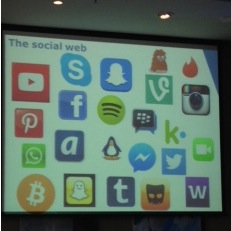On the 14th of October, me and other members of the Optimus team travelled up to Manchester for the Child Protection in Education conference. Wet, chilly and a bit bleary-eyed from the early morning, we headed to the beautiful Lowry hotel to set up the event, ready to welcome the delegates and looking forward to a day of important updates and useful ideas about safeguarding children in schools. Read on to hear about my experience and get 5 practical take-aways from the day.
As the delegates arrived and helped themselves to coffee and pastries, there was plenty of buzz in the room as people recognised colleagues in other schools and chatted to the representatives at the exhibition stands. It was great to see some key educational suppliers supporting Optimus on the day (Lightspeed Systems, Hays Recruitment and Behaviour Watch) including Browne Jacobson who delivered a number of important sessions on the programme.
With a cheery rock-star-esque 'Good morning Manchester!' Richard Bird kicked off the day, expertly setting the context and introducing the panel of speakers for the keynote sessions. Richard spoke about what a difficult year it’s been in safeguarding, with continued reports coming from 'a string of authorities of one kind or another where power and authority has been used to conduct and conceal abuse'. Despite the ‘shell shock’ some might be feeling, Richard praised the role of teachers in uncovering and highlighting safeguarding issues. Over and over in serious case reviews it’s been teachers who've raised the alarm.
We were reminded that a school’s first duty is to keep children safe - bringing us neatly to the new Keeping Children Safe in Education guidance, which Dai Durbridge went on to unpick in his presentation. Dai focused on the role of DBS checks in managing volunteers, describing them as like ‘the seatbelt in a car’ – an important part of road safety, but not the whole picture. He was keen to stress that DBS checks are not a magic shield – it’s more important to make sure you've got the right people, who are good teachers and positive influences on children.
The third keynote came from Dr Zoe Hilton of CEOP about emerging online threats and the latest social media risks. She had everyone talking when we were asked to identify all the apps on the screen – can you identify them all?  Later the room fell silent as we watched a harrowing account of a young person being blackmailed online and the messages that passed back and forth between the victim and the perpetrator. Zoe talked us through the resources offered by CEOP which help schools educate their pupils to spot and handle this type of abuse online. There’s also the ‘Click CEOP’ button which allows parents, kids and staff to make direct disclosures when they spot any abuse online.
Later the room fell silent as we watched a harrowing account of a young person being blackmailed online and the messages that passed back and forth between the victim and the perpetrator. Zoe talked us through the resources offered by CEOP which help schools educate their pupils to spot and handle this type of abuse online. There’s also the ‘Click CEOP’ button which allows parents, kids and staff to make direct disclosures when they spot any abuse online.
John Guest mentioned online threats in his session on effective multi-agency working. He encouraged Safeguarding leads to invite their pastoral and e-safety colleagues into a wider safeguarding team to provide support and a consistent, aligned approach to managing online risks. I really enjoyed meeting the Child Protection in Education delegates and hearing their stories, ranging from tales of scary Ofsted inspectors to dilemmas about how to deal with challenging safeguarding issues. The key message I took away from the day was the importance of support and team work – it’s vital that safeguarding leads stay up to date, have a team in place to provide support and keep working with other organisations towards better outcomes for vulnerable children. It was great to meet so many education professionals doing just that.